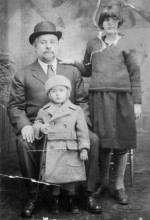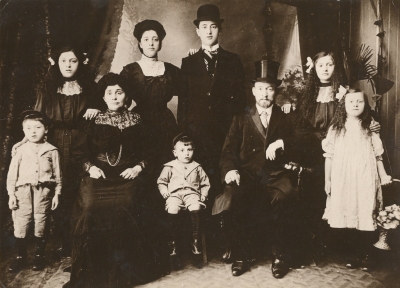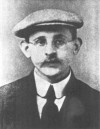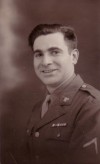|
HISTORY OF THE STAROLETNI FAMILY
The name “Staroletni” means “old man”, and this family has been traced back to the early 19th century in Radzilow. Two branches are currently known, but only one of these has been traced. Mendel Staroletni was a cobbler, and had a daughter in 1845 by his first marriage, and then at least six children in the 1860s by his second. His youngest child was named after him c.1872, so it is assumed he died during his wife’s pregnancy.
As the 20th century began, Mendel’s children began to emigrate from Radzilow. Dawid moved to New Haven, CT, under the surname Levine, and had a number of children, and some of his descendants still live there today. Chaim Lejb moved to South Africa, possibly via New York, and Pesach moved to Detroit, MI. These two branches have not been able to be traced.
Sara Rywka, a harsh and unforgiving woman with a very bad reputation amongst her descendants, followed her husband, Daniel Tyszkowski to London in early 1901. Some say he hoped she would not follow, and did not send for her when he had established himself, but she gathered up their five children, moved to London (whilst pregnant) and tracked him down herself! This story is, however, only rumour. When Sara Rywka’s daughter-in-law Brajna produced a third daughter at the end of 1918, she urged her son Zelig to divorce her, reminding him that, halachically, a man need only to repeat the words “I divorce you” three times in succession, and the marriage would be annulled. However, Zelig refused to listen to his mother, and he & Brajna went on to have two more daughters!
See Sara Rywka and her family's listing on the 1901 UK census
Read transcriptions of Daniel's naturalisation papers from 1911
See more photos of Daniel and Sara Rywka's descendants
See photos of Zelig and Brajna and their family
However, the most memorable stories involve Moszk Staroletni, another son of Mendel, and his family. Moszk married in Radzilow in 1890 and had eight children. In early 1914, his eldest daughter, Chawe, a dressmaker, emigrated to Connecticut, where she stayed with her uncle, Dawid and family, for whom she worked as a domestic servant. It is said that her uncle and his family worked her very hard for some years, before she moved on to work for another family. She never married, and died in New Hampshire in 1982.
See Chawe's immigration listing on the Ellis Island database
A few months after Chawe had left Radzilow, the First World War broke out, and her elder brother Mendel moved to Moscow to find factory work, as he had not been included in the first draft for the Russian army. He was drafted a few months later, though did not serve in the front line due to short-sightedness. His fascinating account of his three years of service in Russia, China and then his route to America via Japan in 1918 is told in his memoirs, “In The Lion’s Den”, which he published in 1964. Once settled in New York, and with the new name of Max Star, Mendel became a point of contact for his brothers as they all followed him to the States in the 1920s. He had a successful business career and moved to Tampa, FL.
Read Max Star’s book, “In The Lion’s Den”
See immigration listings for Max's brother Izrael and their cousin Feiwal
By 1930, Max was established in Tampa and his youngest brother, who was 21 and became known in the US as Philip, wanted to leave Radzilow too. However, the US immigration laws had changed since their brothers’ arrivals in the 1920s, and Philip realised he would not be granted entry. Therefore, he and Max concocted a scheme to smuggle him into the country. Philip sailed to Mexico, and stowed away aboard a cargo small vessel, bound for a port in the Deep South, probably Tampa. Once safely on board the ship, he “borrowed” a sailor’s hat, and walked ashore unnoticed, where Max met him, and the pair disappeared into the city. Philip fought for the US Army in World War II from December 1943, during which time he was posted to England on several occasions and successfully made contact with his Tiskofsky cousins. After the war, he continued to visit his English cousins on several occasions over 30 years.
Around the same time as Philip left Radzilow, his youngest sister Bella also left, but to move to Israel. She had married a man named Mendel Lichtensztejn, who is rumoured to have been a very distant cousin, although the couple changed their name to Inbar in Israel.
By the time war broke out in 1939, Moszk and his wife Chana Basza had only one remaining daughter in Radzilow, Liba, who had married a man named Josef Fajkowski in 1924 and had three young children. At the outbreak of war, the area which included Radzilow came under Russian control, but this was ceded to Germany in the summer of 1941. It is believed that Liba died before this, possibly from a female disease, such as ovarian cancer, leaving Josef to guide their children through such precarious times. He had apparently fought for Germany in the First World War and, when the Germans had moved into the town, he dressed in his old uniform in an attempt to gain their respect, and sought a meeting with them. During this meeting, he pleaded with the German officers not to harm the town’s Jewish population, but the officers simply laughed at his audacity and shot him dead in mid-conversation.
This tragic result of Josef’s bravery meant that his three children were now orphans. Naturally, they were taken care of by their grandparents, Moszk and Chana Basza, who were now in their 70s. Despite the pleas of their children from abroad, they had refused to leave the heim. They felt that America was “treif” (unclean) and feared they would not be able to maintain their observance of Judaism, and had firmly resisted all their children’s wishes. In the final act of a tragedy almost beyond imagination, Moszk, Chana Basza and their three grandchildren were victims of the pogrom in Radzilow on 7 July 1941. The elderly couple had refused to leave the heim for fear their principles would be destroyed. Instead, their lives were destroyed.
Read about the Radzilow pogrom on 7 July 1941, in which the town’s Jewish population was massacred
View the Tyszkowski group memorial page for Holocaust victims
|



